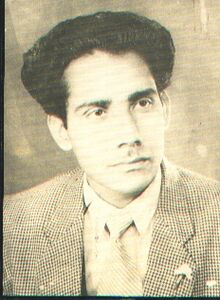Khawar Rizvi facts for kids
Quick facts for kids
Khawar Rizvi
خاور رضوي |
|
|---|---|

Syed Sibte Hassan Rizvi
|
|
| Native name |
سید سبط حسن رضوی
|
| Born | 1 June 1938 |
| Died | 15 November 1981 (aged 43) Ahmedpur, Pakistan |
| Parents |
|
| Occupation | Social security worker, Banker and Poet |
| Nationality | |
| Citizenship | Pakistani |
Khawar Rizvi (born June 1, 1938 – died November 15, 1981) was a famous poet and a smart scholar. He knew a lot about the Urdu and Persian languages. His real name was Syed Sibte Hassan Rizvi. He picked the pen name "Khawar" for his poems and writings. "Khawar" means "the East" in Persian. He really loved the East, its culture, and its ideas.
Khawar Rizvi's Early Life and Work
Khawar Rizvi came from a respected Syed family. He was born on June 1, 1938. Some records say he was born in 1936. However, official papers show his birth year as 1938.
He got his talent for poetry from his mother, Abida Begum. She was also a very good poet. Sadly, most of her poems were not saved. His uncle, Dr. Abul Hassan, was a well-known poet and scholar. Bano Saidpuri, a famous poet, was his aunt. Khawar Rizvi's father, Syed Najm ul Hassan Rizvi, was in the Pakistan army. He always supported his son to become a great person.
Khawar Rizvi loved learning from a young age. He went to Government School in Campbell Pur, now called Attock. He then graduated from Government College Attock. After that, he studied literature at the University of Punjab.
He started his career as a teacher. Later, he worked in the banking sector. He became a very good banker. But he did not like it when poor people were treated unfairly. So, he left his banking job. He wanted to help people more. Khawar then joined the social security department in Pakistan. This department helps people with things like unemployment or illness.
He was working as a director in this department. On November 15, 1981, he died suddenly from a heart attack. This happened while he was traveling to work. Thousands of people attended his funeral. He was buried in the graveyard of Ahmad Pur Sial. This is a historic small town in Jhang District, Pakistan. His death at age 43 made many people sad across South Asia.
Khawar Rizvi's Beliefs and Activism
Rizvi was part of the Progressive Writers' Movement. This group was active in India and Pakistan. Khawar was against all kinds of unfair rule. He disliked tyranny (cruel government), dictatorship (rule by one person), and subjugation (being controlled by others). He also fought against exploitation (using people unfairly).
Because of his strong beliefs, he faced problems. This was due to the policies of General Zia-ul-Haq. He was a leader in Pakistan at that time. Rizvi fought for freedom of expression (the right to speak freely). He also worked for civil liberties (basic rights), human rights, and equality. He wanted to help reduce poverty (being very poor).
Honoring Khawar Rizvi's Work
Many people recognized Rizvi's progressive poetry. This happened both when he was alive and after he died. Writers and poets shared their sadness about his death. These included Ahmad Nadeem Qasimi, Tanveer Sipra, Professor Yousuf Hassan, Amjad Islam Amjad, Munno Bhai, and Hassan Akhter Jalil.
Ahmad Nadeem Qasimi wrote about him in his literary magazine "Funnon." This magazine was published from Lahore. Khalid Ahmad wrote a long article about Khawar's poetry. It was published in "Daily Jang" Karachi. Hassan Rizvi also wrote about him in the daily "Jang" Lahore. Azhar Javed wrote about him in his magazine "Takhleeq."
The magazine of Government College Attock, "Mashal," had a special section. It was all about Khawar Rizvi and his poetry. Poets like Iqbal Kausar and Dr. Saad Ullah Kaleem also praised Khawar's poetry. Professor Zafar Jaunpri and Saeed Jaunpuri did too.
The names and works of Khawar Rizvi and his son, Dr. Syed Shabih-ul-Hassan Rizvi, are in many books. These include books by Rashid Amjad, Raghab Shakeeb, and Waqar bin Ellahi. A popular magazine called Kidzine International also honored Khawar Rizvi. They wrote:
He was respected as a thinker and scholar. His life was short, but he did many great things. Khawar Rizvi had progressive ideas. He never accepted being controlled by others. Even though he had a high position, he always defended workers' rights. All his life, he loved young people and children. He never liked being sad or thinking negatively. He was so full of life. Death caught him on November 15, 1981, when he was only 43. He was far from home. Even after many years, he lives in the hearts of those who love him and his poetry.

